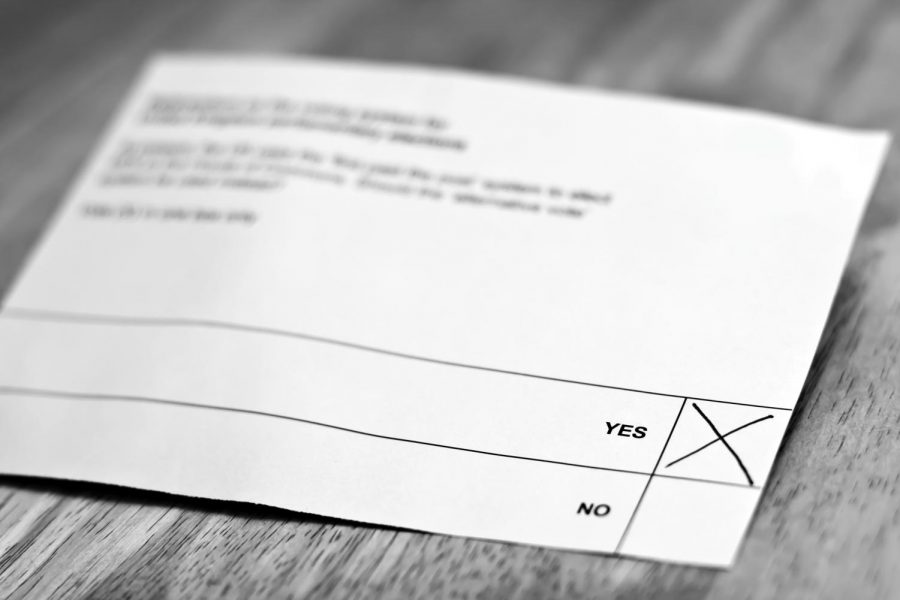Unfortunate results of NY’s constitution amendments on ballot
November 12, 2021
On Election Day, New York voters saw five questions regarding proposals to the state’s constitution that spanned redistricting, climate change, voting and the civil courts’ jurisdiction on the back of their ballot. Surprisingly and unfortunately, only two of the five are projected to pass.
It is unusual for many ballot proposals to fail in New York. Between 1985 and 2020, 74% of all ballot proposals passed.
However, heavy Republican resistance, including a “Just Say No” tour, encouraged Republicans to vote against many of the proposals, while many Democrats didn’t vote on them at all.
The measures that didn’t pass were questions one, three and four. Question one on the ballot dealt with the redistricting process in New York. Among the changes proposed included freezing the number of state senators at 63.
It also would have called for prisoners to be counted at their home address, not their place of incarceration, in the census for redistricting purposes and for every person in the state to be counted in the population, regardless of citizenship status.
Freezing the number of state senators would have been an excellent addition to the state’s constitution. Currently, new Senate districts can be added through the redistricting process.
Unfortunately, this can be exploited by the party in power by adding one more vote in its favor, thereby pushing its agenda forward.
Additionally, counting everybody regardless of citizenship status in the census is common sense.
People are people, regardless of status, and residents of all statuses work, pay taxes and contribute to the state as much as anybody else. It would be foolish and exclusive of the state to pretend these people do not exist, and political parties will draw inaccurate districts as a result.
However, it is understandable why this vote didn’t go through. Redistricting is a complicated process, and it would have been difficult for a person who has no knowledge of it before receiving a ballot to understand the process in a few minutes. With different variables in play, this proposal is the least surprising one not to be passed.
The third question on the ballot proposed eliminating the requirement in the state’s constitution for any voter to be registered at least 10 days before an election. The fourth question proposed deleting the provision in the state’s constitution requiring voters to provide a valid excuse to receive a ballot by mail, allowing absentee voting to carry on as it has during the COVID-19 pandemic.
Attacking easier methods of voting is a key mission of Republicans, with former President Donald Trump leading the way before the 2020 election, claiming that absentee ballots cause fraud and are a “formula for RIGGING an Election.”
Republican-led states such as Texas, Florida and Georgia are cracking down on voting procedures, including early voting and absentee voting, and passing laws to hinder voter turnout and sway elections in the party’s favor.
Despite there being absolutely no merit to this argument, absentee voting is a safe alternative with incredibly rare instances of fraud.
Folks across the country stood hours in line at poll sites to vote during the 2020 election as a result of high turnout. Instead, people could cast their ballots at home andmail them out to ease the lines. proving to be more convenient and just as safe.
Moreover, permitting absentee voting may increase voter turnout consistently, as many people do not have time to vote on Election Day because it is not a recognized national holiday.
This way, people who want to vote but can’t because of their schedules have another way to engage in their civic responsibility.
Similar claims of fraud are levied on same-day voter registration. Republicans accuse proponents of same-day voter registration of encouraging fraud in favor of Democrats.
However, just as with absentee voting, this claim is false.
If anything, same-day voter registration is more secure, given that the person registering is in front of an election worker and can verify identification and any other necessary information on- site.
Republicans also reason that increased voter turnout skews elections in favor of Democrats. While this was generally true for the past few decades, this is simply a generalization.
In the 2021 elections, increased voter turnout favored Republicans. Given the unpopularity of President Joe Biden and the increased enthusiasm of Republican voters because of Trump, voting restrictions might hurt the Republican Party.
While it is unfortunate that these three measures failed to pass, some good may come out of the ballot proposals projected to pass.
Question two proposed amending the New York State Constitution’s Bill of Rights to include a right to clean water, clean air and a healthful environment.
After the adoption of this proposal, New Yorkers will be able to sue their government if they feel any of these rights has been violated. The law would also require lawmakers to consider these rights when making decisions.
This will foster government accountability and benefit the health of New Yorkers, especially those who have been deprived of these rights in the past.
Question five proposed amending the state’s constitution to allow the state’s civil courts to hear and decide on claims worth up to $50,000, up from the current $25,000 threshold.
This decision is widely applauded because it will reaffirm the legitimacy of the state’s judges and foster a more efficient judicial branch in the state, where cases are backlogged due to the COVID-19 pandemic. More cases will be heard by the state’s civil courts, thus balancing the workload among the courts.
While it is a disappointment that overblown fears and lack of understanding around redistricting and voting prevented significant measures from being adopted, New Yorkers can be proud of their newly established environmental rights and be hopeful that their civil cases will be heard in a more timely manner.








